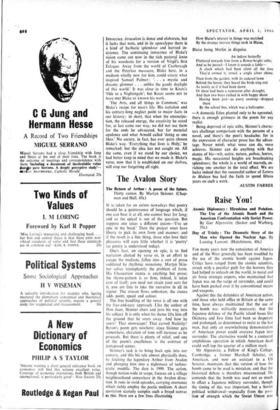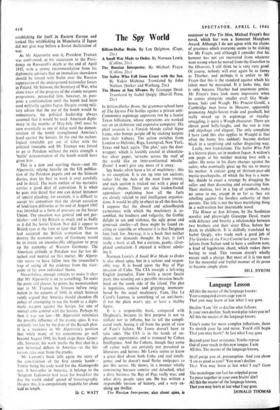Raise You!
Atomic Diplomacy : Hiroshima and Potsdam. The Use of the Atomic Bomb and the American Confrontation with Soviet Power. By Gar Alperovitz. (Seeker and Warburg, 35s.) Day of Trinity : The Dramatic Story of the Men who Opened the Nuclear Age. By Lansing Lamont. (Hutchinson, 40s.) FOR many years now the conscience of America and of the West generally has been troubled by the use of the atomic bomb against Japan. Critics have ranged from the atomic scientists, struck with a peculiar guilt for the horrors they had helped to unleash on the world, to naval and air force strategic experts, who maintained that Japan was on the verge of surrender, and could have been pushed over it by conventional means and weapons.
Against this the defenders of American action, and those who held office in Britain at the same time, have always maintained that the use of the bomb was militarily necessary; that the Japanese defence of the Pacific island bases like Okinawa and Iwo Jima had been so desperate and prolonged, so determined to resist to the last man, that only an overwhelming demonstration of American power could overawe Japan into surrender. The alternative would be a contested amphibious operation in which American dead could well top the quarter of a million mark.
Mr Alperovitz, a Fellow of King's College, Cambridge, a former Marshall Scholar, an American, and now an assistant to a US Senator, maintains that this version of how the bomb came to be used is mistaken, and that the historical debate is therefore misconceived. He contends that the bomb was used not so much to effect a Japanese military surrender, though the timing of this was important, but a Soviet political withdrawal—especially from the posi- tion of strength which the Soviet Union was
establishing for itself in Eastern Europe and looked like establishing in Manchuria if Japan did not give way before a Soviet declaration of war.
As Mr Alperovitz sees it, President Truman was confronted, at his succession to the Presi- dency on Roosevelt's death at the end of April 1945, with a strong recommendation from his diplomatic advisers that an immediate showdown should be forced with Stalin over the Russian suppression of the underground nationalist forces in Poland. Mr Stimson, the Secretary of War, who alone knew of the progress of the atomic weapons programme, persuaded him, however, to post- pone a confrontation until the bomb had been- used militarily against Japan. Despite strong mili- tary advice that the use of the bomb would be unnecessary, the political leadership always assumed that it would be used. American diplo- macy in the months of May-July 1945 must be seen essentially as one of delay until the demon- stration of the bomb strengthened America's hand against the Soviets. In the end the techno- logical timetable got out of kilter with the political timetable and Mr Truman was forced to go to Potsdam without the extra strength a 'battle' demonstration of the bomb would have given him.
This is a new and startling thesis—and Mr Alperovitz, relying heavily on the US publica- tion of the Potsdam papers and on the Stimson diaries, does his best to work it over carefully and in detail. The main outline of his narrative carries a good deal of conviction. It is when he goes into detail that one can detect instances of special pleading; for example, it is difficult to accept his contention that the abrupt cessation of lend-lease deliveries at the end of August 1945 was intended as a form of pressure on the Soviet Union. The cessation was general and not_par- ticular—and it hit Britain as much and as badly as it did the Soviet Union. Nor did it appear to British eyes at the time or later that Mr Truman had accepted the British contention that to destroy the economic unity of Germany would be to create an unendurable obligation to prop up the economy of Western Germany. The American attitude at Potsdam was far too db-- tached and neutral on this matter. Mr Alpero- vitz seems to have fallen into the researcher's trap of seeing all the evidence from the view- point of his own individual theme.
Nevertheless, enough remains to make it clear that Mr Alperovitz is on to something. To make the point still clearer, he prints the memorandum sent to Mr Truman by Stimson before resig- nation in the autumn of 1945, in which Stimson vainly argued that America should abandon ttte policy of attempting to use the bomb as a diplo- matic weapon against the Soviets for one of mutual arms control with the Soviets. Perhaps by then it was too late—Mr Alperovitz minimises the possible influence of the atomic spies. It was certainly too late by the date of the Baruch plan. It is a weakness in Mr Alperovitz's position that while many of his contentions go well beyond August 1945, his book stops there. Gener- ally, however, his work marks the first shot in. a new historical debate in America—as the his- torians take over from the cranks.
Mr Lamont's book tells again the story of the construction of the first atomic bomb— Trinity being the code word for the Alamogordo test. A best-seller in America, it belongs to the 'Sergeant Jankowitz had toast for breakfast the day the world ended' school of historiography. Despite this, it is compulsively readable for about half its length.
D. C. WATT



































 Previous page
Previous page